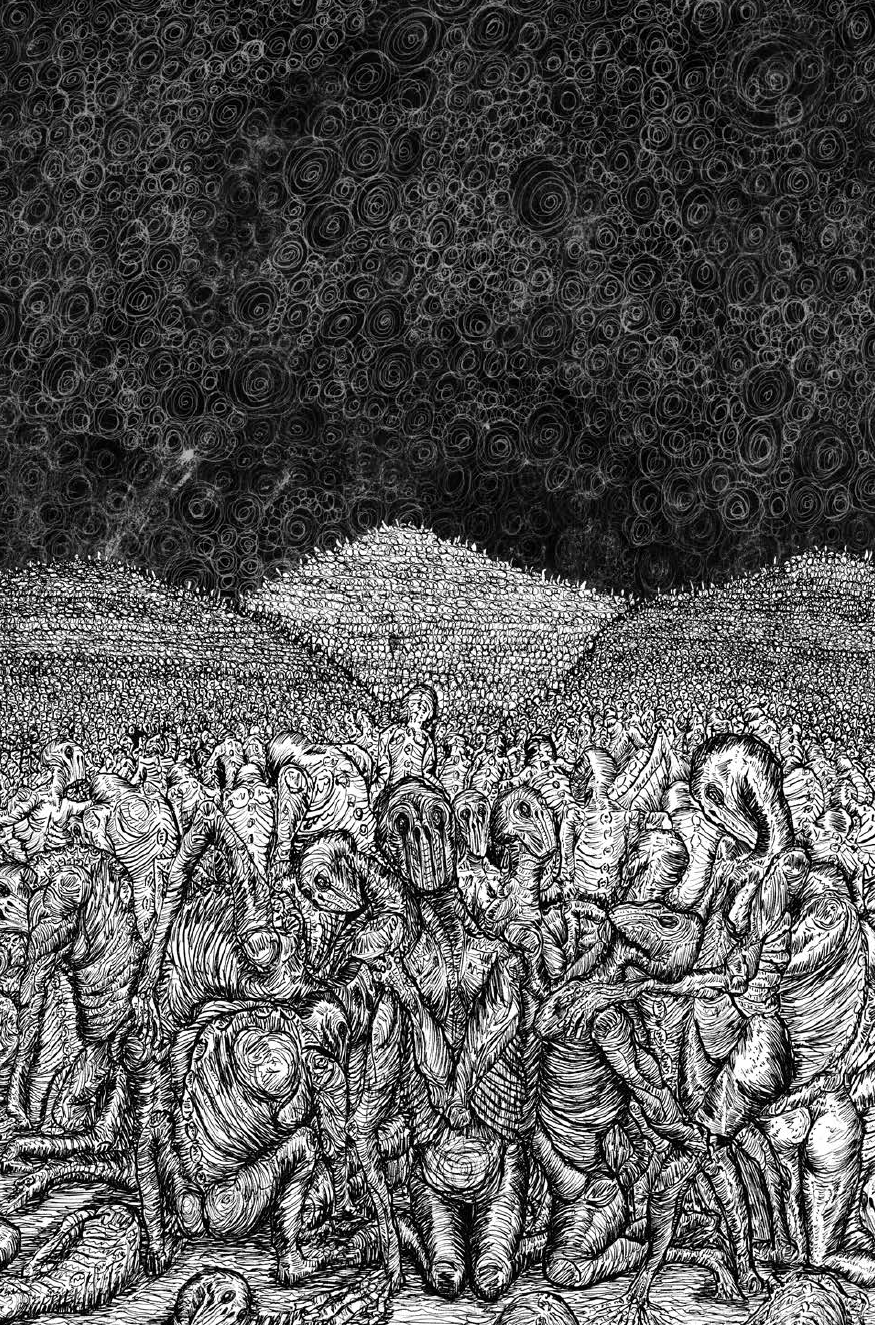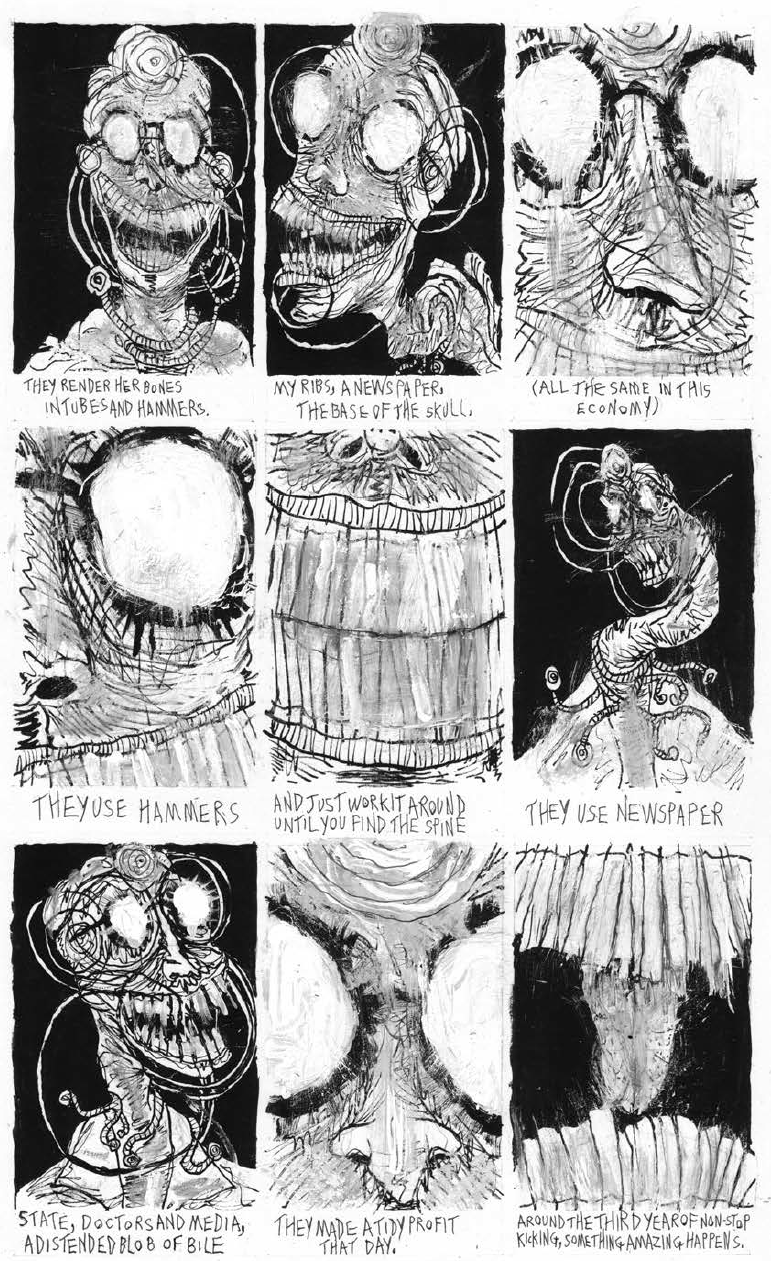Hey, quick question - have you ever been the target of an international hate campaign intended to bolster the rise of fascism through the violent scapegoating of vulnerable minority communities? Because, if you haven’t, I would not recommend it! There you are, just minding your own business, eating a sandwich, and the hate mob appears. Hi! the mob says, quite chipper, mind if we tie you up and drag you behind a pickup truck? Don’t worry, we’ll stop the truck when you’re dead.
Can I finish my sandwich first?
It is a difficult thing to live in the shadow of so much incandescent hatred. Hard not to have that in the back of your head when you go about your business. It’s a background noise that enacts a toll on your consciousness regardless of how well you manage to insulate yourself from daily eruptions. There is no certain insulation against that kind of ambient sound. The fear becomes part of the furniture of your life.
I try to stay busy, like to write a lot. Creating is an act of hope for the future. That’s something I see so strongly in Erika Price’s work. It’s really something, quite remarkable. Now, I promise, there’s not a lot of sunshine in this work. It’s not a book that ends on anything more than a specter of increasing darkness, literal bodies piled so high as to become an indistinguishable black & white blur. Not a book to read if you’re already in a bleak place, I don’t believe - it’s a bleak work, suffused with a darkness so unrelenting as to be, in any other context, suffocating or even just morose. But it’s not a long read, for all that. It sticks around just long enough to make its point: a series of comics essays on various existential themes and personal anxieties. Very vivid snapshots of the worst mood conceivable.
It feels, on reflection—for all its abandon and absolute, bald-faced earnestness—a vulnerable work, and a very timely one. It’s honest and contemporary; a snapshot taken at the dawning realization of incumbent horror. Articulation of the awful certainty bubbling its way up through the culture so that the raft is really starting to list.
The alarm is being raised, however. You can’t say that no one’s ringing that bell. People are even starting to listen, I’d argue, which is precisely why they’re so anxious to jam the culture about now. But I’m not telling you anything you don’t know. You already read The Comics Journal. You’re hip, with it. Down with the counterculture. A gentle creature of leisure, up on the headlines most certainly. Well, friend, I am here to report that what remains of our counterculture is being jammed pretty hard. You practically have to scream to be heard over the din.
What we’re looking at today is the self-published third and final issue of Price’s Disorder series. Aesthetically, it’s an engrossing experience: these aren’t fun drawings, but it is nevertheless enjoyable to appreciate the sheer physicality at work in the production of these pages, absolutely worried over in every sense of the word. These aren’t minimal objects. These are maximalist artifacts, the product of the kind of fixated over-rendering I associate with certain of the members of Fort Thunder. But I don’t really associate any kind of emotional range with the subjects of Brian Chippendale’s or Mat Brinkman’s narratives; a weakness, perhaps, but a strangely productive one when you consider just how influential—and in some ways simply predictive—the entire ramshackle concern actually was. The most storied Staples in comics history.
But the most important aspect I haven’t yet mentioned is a simple fact of genre. Disorder is straight up horror, specifically of the body variety. It’s not really a book explicitly about politics or current events at all, is the thing - it actually more resembles a personal nightmare journal. It’s all the realm of pure metaphor, abstracted and mortified bodies with monstrous, Munchian features, endlessly tormented by their immediate surroundings. It’s about bodies in agony, at stress, under scrutiny. Some of the “stories” (“sketches” might be more accurate) only make any sense as first-person exercises. A surprisingly rare genre of comic, once you start to think about it. Often resembles hallucinations brought on by an extended bout of sleep paralysis.
It’s got a little of that Rory Hayes energy, perhaps, but truly committed to body horror over every other form of expression. There’s an alternate universe, somewhen, where Clive Barker took the death of Marvel’s Barkerverse a lot harder, ended up living in Rhode Island for a spell in the late '90s. Maybe that Barker did weird horror comics for a while while chilling with the art students. Our Barker never did anywhere near enough work in the genre himself, I hasten to say, despite his superior skill as a visual artist.
This is a book about pain, bodies being rended, violated, simply abandoned. There is both singular pain, individual, and the pain of groups - heaps and heaps of people shorn of any kind of individuating features. Just grotesqueries allowed to molder and die. The singular subject of these pieces appears to be trapped between two sides of a disrupted equilibrium - there’s not a lot room to spare, between the teeth of a world that hates and the claws of your own self-hatred.
Massive emaciated specters totter on the peaks of bloody skyscrapers, hideous revenants airing the grievance of a dying people. “I told them what they needed to hear,” the words above the ghouls reads. “And now I don’t know whose body is lodged in my throat.” The word “sever” recurs a distressing number of times, a subliminal cadence of mutilation. One sequence deals directly with the medical establishment, a staccato monologue of malfeasance. And journalistic implements as well - hammers and newspapers accomplish much the same damage when you’re... y’know. A member of the heretofore alluded vulnerable minority community.
Being queer in a world that hates you can be kind of a drag, man. Especially if being trans is something that inspires, in many instances, at least, a tendency towards... well, let’s be euphemistic for the benefit of the cis folks in the house. We'll say: excruciating self-criticism. It’s easy to hate yourself when your brain is constantly telling you something is wrong. Body horror is kind of a thing for trans artists in general, in case you hadn’t noticed. Some of it's even popular. “They’ll pick the meat off us,” one sequence in Disorder intones, “prestige awards lodged in our throats.”
The membrane between the public and the private is vanishingly thin for everyone these days, but its been rent completely for trans people. Coming out of the closet means abjuring privacy simply as a condition of doing business. There’s no euphemistic barrier between the queer subject and the political climate that exists in opposition to the aforementioned queer subject. That anxiety is familiar, yes, but it’s also prescient. Trans people are getting it pretty bad right now, but we’re hardly the only ones in the barrel, and the radius of aperture for that awful barrel is expanding every day. All this despite—or perhaps because—of the seeming antipathy towards anti-queer politics expressed by clear polling majorities. That doesn’t seem to make any difference; if anything it only goads them harder.
The sense of that hatred, as less a tangible effect by knowable actors, and more a miasmic malevolence just set down in the heart of nations, indifferent to all known inducements and incentives... well, that fear is pretty tangible. Inescapable, a challenge made doubly so when you also have to fight a rearguard action against yourself. Your own self-doubt, anxiety - fear both of and for the future. Such a vivid and hellacious feat of emotional description Erika Price has given us. Harrowing is the word.
And now, if you don’t mind, I’m going to celebrate finishing writing this review by going and thinking about anything at all else, and I recommend you do the same now that you've read it. It’s an important mood, a mood to feel and remember, but not a mood on which to linger if you can possibly help. It’s a terrifying book and a terrifying world. Take care of yourself. It’s rough out there. Remember to breathe. Finish your sandwich in peace.











